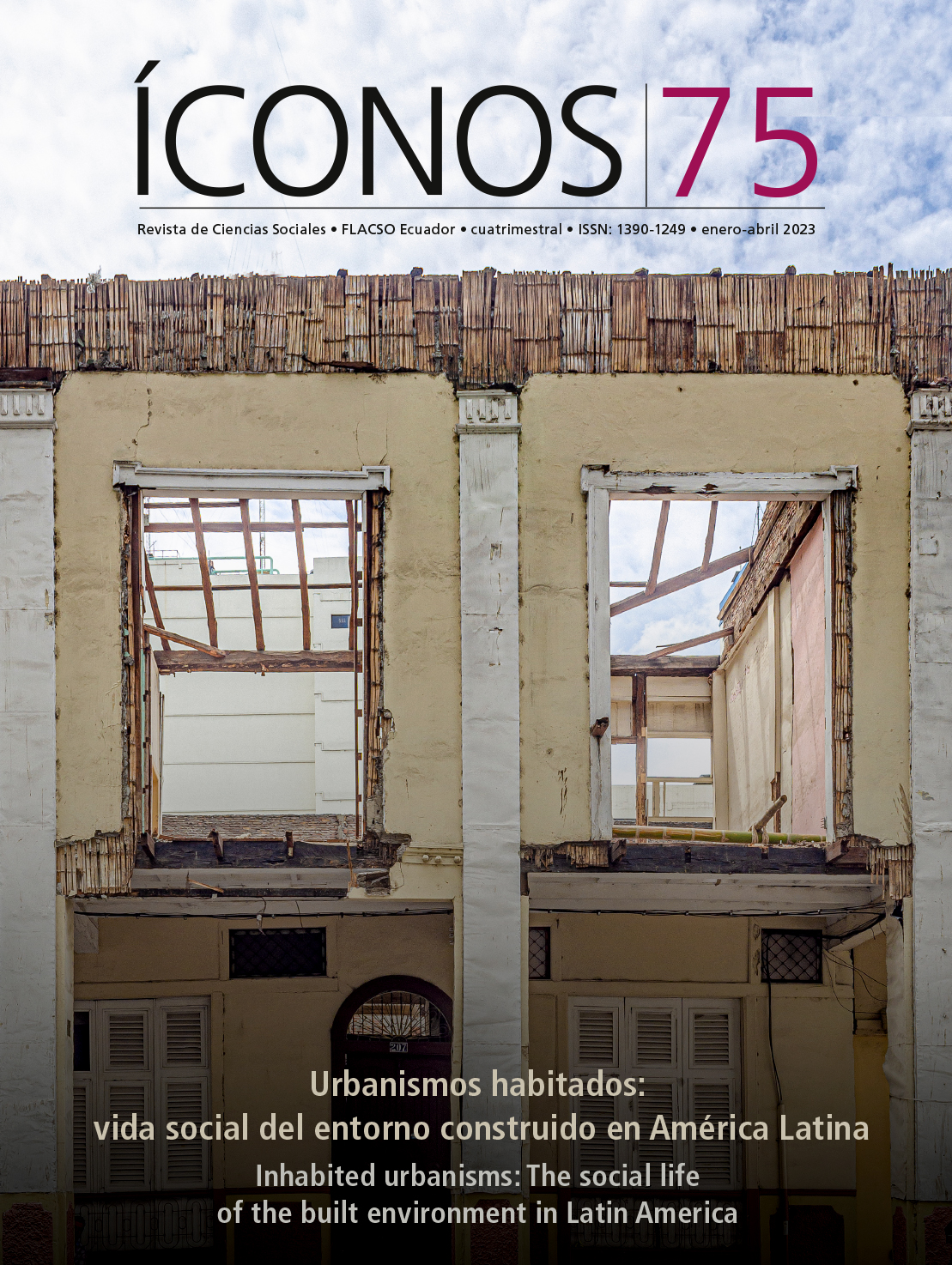Resiliencia y ciudad neoliberal: una genealogía sobre América Latina
Resumen
¿Por qué usamos el término resiliencia y cuáles son las implicaciones de ese uso para el espacio urbano?, con base en tal interrogante se desarrolla la reflexión del presente artículo. El propósito con este texto es ilustrar, de forma dialéctica, la manera en que se ha utilizado la resiliencia en las estrategias neoliberales de transformación urbana, puesto que ha sido instrumentalizada a fin de normalizar los diversos espacios de las ciudades. Para responder a la pregunta se empleó el análisis documental como metodología de investigación. Entre los principales resultados a los que se llegó con el estudio en que se basa este artículo, sobresalen dos aspectos hasta ahora no investigados sobre la resiliencia urbana. Primero, que el uso del término presenta las características típicas de los conceptos performativos, con el poder que ese tipo de nociones tiene para reducir su objeto a una narración hegemonizante y repetitiva –en este caso, lo urbano y su construcción–. Segundo, en línea con las teorías críticas del urbanismo y a través de un análisis genealógico de inspiración foucaultiana, aplicado al uso instrumental de la resiliencia, se demuestra cómo esta se ha convertido en una noción funcional al proyecto neoliberal, que ha dominado los procesos de cambio en las urbes de América Latina durante el siglo XXI.
Descargas
Citas
Alimonda, Héctor, ed. 2011. La naturaleza colonizada: ecología política y minería en América Latina. Santiago de Chile: Centro de Integración, Comunicación, Cultura y Sociedad / CLACSO.
Allen, Adriana, Andrea Lampis y Mark Swilling, eds. 2015. Untamed Urbanisms. Londres: Routledge. https://doi.org/10.4324/9781315746692
Atkinson, Paul, y Amanda Coffey. 2010. “Analysing Documentary Realities.” En Qualitative Research, editado por David Silverman, 77-92. Londres: SAGE Publications.
Bak, Per. 1999. Quand la nature s’organise: avalanches et tremblements de terre. París: Flammarion.
Beck, Ulrich. 1992. Risk Society: Towards a New Modernity. Londres / Nueva York: SAGE Publications.
Béné, Christophe, Lyla Mehta, Gordon McGranahan, Terry Cannon, Jaideep Gupte y Thomas Tanner. 2018. “Resilience as a Policy Narrative: Potentials and Limits in the Context of Urban Planning”. Climate and Development 10 (2): 116-133. https://doi.org/10.1080/17565529.2017.1301868
Béné, Christophe, Rachel Godfrey Wood, Andrew Newsham y Mark Davies. 2012. “Resilience: New Utopia or New Tyranny? Reflection about the Potentials and Limits of the Concept of Resilience in Relation to Vulnerability Reduction Programmes”. Working Paper, Institute of Development Studies. https://doi.org/10.1111/j.2040-0209.2012.00405.x
Blaikie, Piers, Terry Cannon, Ian Davis y Ben Wisner. 1994. At Risk. Natural Hazards, People’s Vulnerability and Disasters. Londres / Nueva York: Routledge.
Brenner, Neil. 2009. “What Is Critical Urban Theory?”. City 13 (2-3): 198-207. https://doi.org/10.1080/13604810902996466
Brenner, Neil, y Nik Theodore. 2002. “Theoretical Debates Cities and the Geographies of ‘Actually Existing Neoliberalism’”. Antipode 34(3): 349-378. https://doi.org/10.1111/1467-8330.00246
Brenner, Neil, Peter Marcuse y Margit Mayer. 2012. Cities for People, Not for Profit: Critical Urban Theory and the Right to the City. Londres / Nueva York: Routledge.
Cannon, Terry. 2008. “Vulnerability, ‘Innocent’ Disasters and the Imperative of Cultural Understanding”. Disaster Prevention and Management: An International Journal 17 (3): 350-357. https://doi.org/10.1108/09653560810887275
Castells, Manuel. 2013. Después de la crisis. Barcelona: Alianza Editorial.
Chandler, David, y Julian Reid. 2016. The Neoliberal Subject: Resilience, Adaptation and Vulnerability. Londres: Rowman & Littlefield.
Cyrulnick, Boris. 2001. Les Vilains Petits Canards. París: Odile Jacob.
Dauphiné, André, y Damienne Provitolo. 2007. “La résilience: un concept pour la gestion des risques”. Annales de Géographie 2 (654): 115-124. https://bit.ly/3SoXTnJ
Davies, Kingsley. 2020. “The Urbanization of the Urban Population”. En The City Reader, editado por Richard T. LeGates y Frederic Stout, 19-30. Londres / Nueva York: Routledge.
Foucault, Michel. 2008. The Birth of Biopolitics. Lectures at the College de France, 1978‐79. Londres: Palgrave Macmillan.
Füssel, Hans Martin. 2010. “How inequitable is the global distribution of responsibility, capability, and vulnerability to climate change: a comprehensive indicator-based assessment”. Global Environmental Change 20 (4): 597-611. https://doi.org/10.1016/j.gloenvcha.2010.07.009
Giddens, Anthony. 1984. The Constitution of Society: Outline of the Theory of Structuration. Berkeley / Los Ángeles / Londres: University of California Press.
Gugler, Josef. 1996. The Urbanization of the Third World. Oxford: Oxford University Press.
Hall, Kathleen. 2010. “Security and the Neoliberal State: British Political Imaginaries after 7/7”. En Ethnographies of Neoliberalism, editado por Carol J. Greenhouse, 13-27. Filadelfia: Penn State University.
Halliday, Michael, y James Martin. 1993. Writiing Science: Literacy and Discursive Power. Londres: Falner Press.
Harvey, David. 2005. The Political Economy of Public Space. Londres / Nueva York: Routledge.
Heinrichs, Dirk, Rijmin Aggrawal, Jonathan Barton, Erach Bharucha, Carsten Butsch, Michail Fragkias, Peter Johnston, Frauke Kraas, Kerstin Krellenberg, Andrea Lampis, Ooi Giok Ling y Johanna Vogel. 2011. “Adapting Cities to Climate Change: Opportunities and Constraints. Findings from Eight Cities”. En Cities and Climate Change: An Urgent Agenda, editado por Daniel Hoornweg, Mila Freire, Marcus Lee, Perinaz Bhada-Tata y Belinda Yuen, 193-224. Washington D.C.: World Bank.
Holling, Crawford Stanley. 1973. “Resilience and Stability of Ecological Systems”. Annual Review of Ecology and Systematics 4: 2-23. https://doi.org/10.1146/annurev.es.04.110173.000245
IHDP (International Human Dimensions Programme on Global Environmental Change). 2005. “Urbanization and Global Environmental Change”. Report 15, IHDP. https://bit.ly/3SnYwxy
IPCC (Intergovernmental Panel on Climate Change). 2012. Managing the Risks of Extreme Events and Disasters to Advance Climate Change Adaptation. Cambridge: Cambridge University Press https://doi.org/10.1017/CBO9781139177245
Jiménez Pacheco, Pedro. 2016. “Epistemological Clues to Figure out the Right to the City of Henri Lefebvre”. Estoa 5 (8): 21-28. https://doi.org/10.18537/est.v005.n008.03
Law, John. 2008. “On Sociology and STS”. Sociological Review 56 (4): 623-649. https://doi.org/10.1111/j.1467-954X.2008.00808.x
Lefebvre, Henri. 1968. El derecho a la ciudad. Barcelona: Ediciones Península.
Manyena, Siambabala Bernard. 2006. “The Concept of Resilience Revisited”. Disasters 30 (4): 433-450. https://doi.org/10.1111/j.0361-3666.2006.00331.x
Marchezini, Victor, y Ben Wisner. 2017. “Challenges for vulnerability reduction in Brazil: Insights from the PAR framework”. En Reduction of vulnerability to disasters: from knowledge to action, editado por Victor Marchezini, Ben Wisner, Luciana Londe y Silvia Saito, 57-96. Sao Paulo: RiMa Editora. https://bit.ly/3VJbglD
Meerow, Sara, Joshua P. Newell y Melissa Stults. 2016. “Defining urban resilience: a review”. Landscape and Urban Planning 147: 38-49. https://doi.org/10.1016/j.landurbplan.2015.11.011
Metzeger, Pascale, y Jérémy Robert. 2013. “Elementos de reflexión sobre la resiliencia urbana: usos criticables y aportes potenciales”. Territorios 28: 21-40. https://bit.ly/3MZNihR
Moncayo Jiménez, Édgard. 2002. “Nuevos enfoques teóricos, evolución de las políticas regionales e impacto territorial de la globalización”. Instituto Latinoamericano y del Caribe de Planificación Económica y Social. https://bit.ly/3i7OMeF
OCDE (Organización para la Cooperación y el Desarrollo Económicos). 2010. Cities and Climate Change. Washington D.C.: Banco Mundial. https://doi.org/10.1787/9789264091375-en
ONU-Habitat. 2020. La nueva agenda urbana. Nairobi: Centro Urbano / ONU-Habitat.
Peter, Camaren, y Mark Swilling. 2014. “Linking Complexity and Sustainability Theories: Implications for Modeling Sustainability Transitions”. Sustainability 6 (3): 1594-1622. https://doi.org/10.3390/su6031594
Pigeon, Patrick. 2012. Catastrophes et Résiliences. Pour Une Géographie de l’urbanisation. París: L’Harmattan.
Potter, Robert, y Sally Lloyd-Evans. 1998. The city in the developing world. Londres / Nueva York: Routledge.
Porter, Libby, Lauren Rickards, Blanche Verlie, Karyn Bosomworth, Susie Moloney, Bronwyn Lay, Ben Latham, Isabelle Anguelovski y David Pellow. 2020. “Climate Justice in a Climate Changed World”. Planning Theory & Practice 21 (2). 293-321. https://doi.org/10.1080/14649357.2020.1748959
Revet, Sandrine. 2011. “Penser et affronter les désastres: un panorama des recherches en sciences sociales et des politiques internationales”. Critique Internationale 52 (3): 157-173. https://bit.ly/3N7sQff
Ribot, Jesse. 2013. “Vulnerability does not fall from the sky: towards multi-scale, pro-poor climate policy”. En Handbook on Climate Change and Human Security, editado por Michael Redclift y Marco Grasso, 164-199. Cheltenham: Edward Elgar Publishing. https://doi.org/10.4337/9780857939111.00016
Robinson, Jennifer. 2002. “Global and World Cities: A View from off the Map”. International Journal of Urban and Regional Research 26 (3): 531-554. https://doi.org/10.1111/1468-2427.00397
Rockström, Johan, Will Steffen, Kevin Noone, Åsa Persson, F. Stuart Chapin, Eric F. Lambin, Timothy M. Lenton, Marten Scheffer, Carl Folke, Hans Joachim Schellnhuber, Bjorn Nykvist, Cynthia de Wit, Terry Hughes, Sander van der Leeuw, Henning Rodhe, Sverker Sorlin, Peter Snyder, Roberto Constanza, Uno Svedin, Malin Falkenmark, Luisa Karlberg, Robert Corell, Victoria Fabry, James Hansen, Brian Walker, Diana Liverman, Katherine Richardson, Pablo Crutzen y Jonathan Foley. 2009. “A safe operating space for humanity”. Nature 461: 472-475. https://doi.org/10.1038/461472a
Romero-Lankao, Patricia. 2012. “Governing Carbon and Climate in the Cities: An Overview of Policy and Planning Challenges and Options”. European Planning Studies 20 (1): 7-26. https://doi.org/10.1080/09654313.2011.638496
Romero-Lankao, Patricia, Sara Hughes, Jorgelina Hardoy, Hua Qin, Angélica Rosas-Huerta, Roxana Bórquez y Andrea Lampis. 2014. “Urban risk and response capacities in neighborhoods of Latin American cities”. Habitat International 42: 224-235. https://doi.org/10.1016/j.habitatint.2013.12.008
Rosnay, Joël De. 2000. L’homme Symbiotique. París: Editions du Seuil.
Roy, Ananya. 2016. “What is urban about critical urban theory?”. Urban Geography 37 (6): 810-823. https://doi.org/10.1080/02723638.2015.1105485
Salinas-Arreortua, Luis Alberto. 2017. “Gestión metropolitana en la zona metropolitana del Valle de México: entre la legalidad y la voluntad política”. Papeles de Población 23 (91): 143-169. http://dx.doi.org/10.22185/24487147.2017.91.007
Sassen, Saskia. 2014. Expulsions: Brutality and Complexity in the Global Economy. Cambridge / Massachusetts / Londres: Harvard Universitiy Press.
Schipper, Lisa, y Mark Pelling. 2006. “Disaster risk, climate change and international development: scope for, and challenges to integration”. Disasters 30 (1): 19-38. https://doi.org/10.1111/j.1467-9523.2006.00304.x
Schipper, Lisa, Thomas Tanner, Opha Pauline Dube, Kevin Adams y Saleemul Huq. 2020. “The debate: Is global development adapting to climate change?”. World Development Perspectives 18: 1689-1699. https://doi.org/10.1016/j.wdp.2020.100205
Sequera, Jorge. 2020. Gentrificación, capitalismo ‘cool’, turismo y control del espacio urbano. Madrid: La Catarata.
Seto, Karen, William Solecki y Corrie Griffith, eds. 2015. The Routledge Handbook of Urbanization and Global Environmental Change. Londres: Routledge. https://doi.org/10.4324/9781315849256
Shamsuddin, Shomon. 2020. “Resilience resistance: the challenges and implications of urban resilience implementation”. Cities 103: 1-8. https://doi.org/10.1016/j.cities.2020.102763
Sherbinin, Alex de, Andrew Schiller y Alex Pulsipher. 2007. “The vulnerability of global cities to climate hazards”. Environment and Urbanization 19 (1): 39-64. https://doi.org/10.1177/0956247807076725
Simon, David. 2016. Rethinking Sustainable Cities: Accessible, Green and Fair. Bristol: Policy Press.
Slater, Tom. 2006. “The Eviction of Criticial Perspectives from Gentrification Research”. International Journal of Urban and Regional Research 30 (4): 737-757. https://doi.org/10.1111/j.1468-2427.2006.00689.x
Smith, Neil. 2008. Uneven Development: Nature, Capital and the Production of Space. Georgia: The University of Georgia Press.
Smith, Neil. 2002. “New Globalism, New Urbanism: Gentrification as Global Urban Strategy”. Antipode 34 (3): 427-450. https://doi.org/10.1111/1467-8330.00249
Sobarzo Miño, Oscar. 2001. “Por uma outra globalização: do pensamento único à consciência universal”. EURE 27 (81): 1-2. http://dx.doi.org/10.4067/S0250-71612001008100008
Solecki, William, Robin Leichenko y Karen O’Brien. 2011. “Climate change adaptation strategies and disaster risk reduction in cities: connections, contentions, and synergies”. Environmental Sustainability 3 (3): 135-141. https://doi.org/10.1016/j.cosust.2011.03.001
Theodore, Nik, Jamie Peck y Neil Brenner. 2009. “Urbanismo neoliberal: la ciudad y el imperio de los mercados”. Temas Sociales 66: 1-11. https://bit.ly/2GfecBj
Thomas, Hélène. 2008. “Vulnérabilité, fragilité, précarité, résilience, etc.”. Esquisses 24 (13): 13-27. https://bit.ly/3eTrpUI
Vercellone, Carlo, Francesca Bria, Andrea Fumagalli, Eleonora Gentilucci, Alfonso Giuliani, Giorgio Griziotti y Pierluigi Vattimo. 2015. “Managing the Commons in the Knowledge Economy. Decentralised Citizens Engagement Technologies; Specific Targeted Research Project Collective Awareness Platform”. Working Paper, Managing the Commons in the Knowledge Economy. https://bit.ly/3VMH1dj
Walker, Jeremy, y Melinda Cooper. 2011. “Genealogies of Resilience. From Systems Ecology to the Political Economy of Crisis Adaptation”. Security Dialogue 42 (2): 143-160. https://doi.org/10.1177/096701061139961
Wallerstein, Immanuel, ed. 1996. Open the social sciences: Report of the Gulbenkian commission on the restructuring of the social sciences. Stanford: Stanford University Press.
Zeiderman, Austin. 2013. “Living dangerously: biopolitics and urban citizenship in Bogotá, Colombia”. American Ethnologist 40 (1): 71-87. https://doi.org/10.1111/amet.12006

Íconos - Revista de Ciencias Sociales bajo licencia Creative Commons Reconocimiento-SinObraDerivada 3.0 Unported License.














